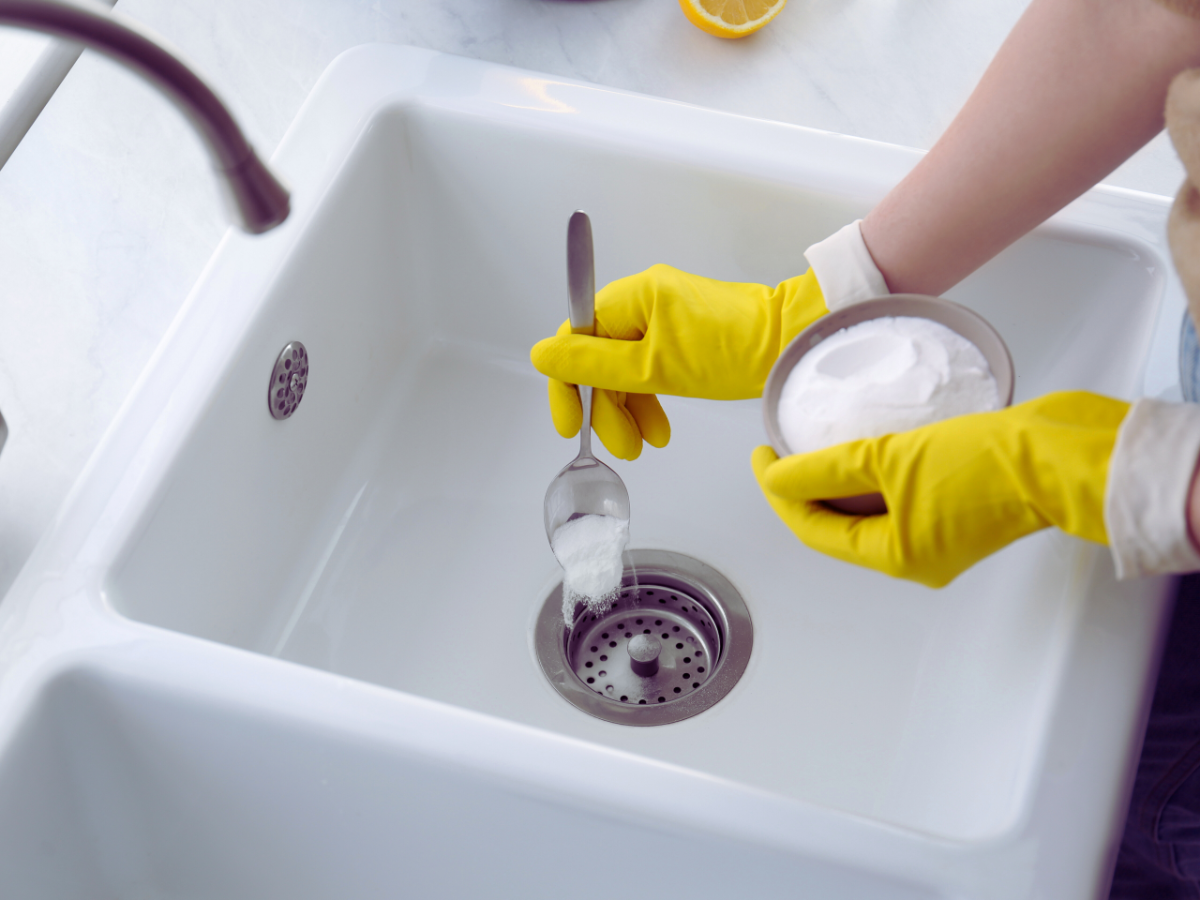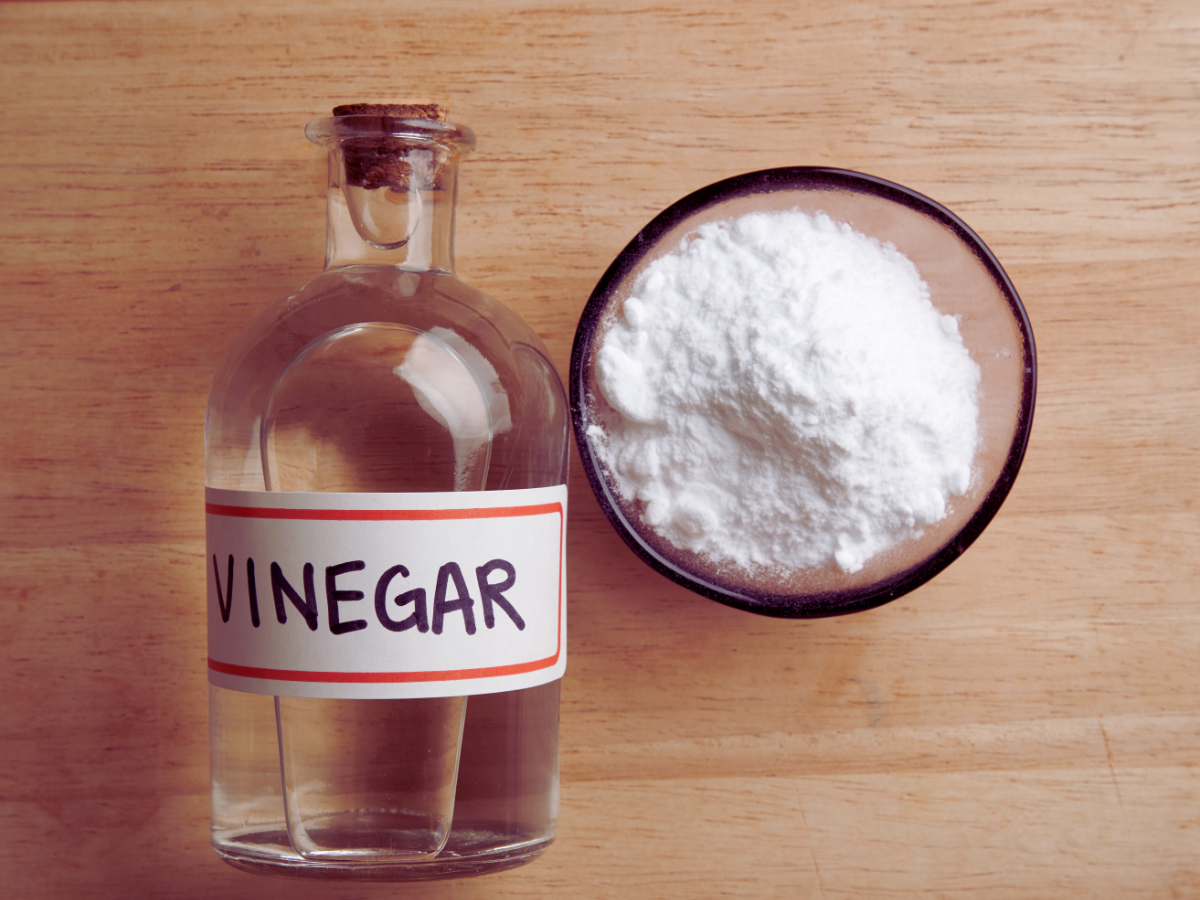 Are you dealing with awful smells, slow-moving drains, and backups? Before you dump harsh chemicals down your drain, try this.
Are you dealing with awful smells, slow-moving drains, and backups? Before you dump harsh chemicals down your drain, try this.
Clogged drains are one of the most common plumbing problems homeowners face. They happen to everyone, and you can easily find aisles of seemingly effective drain cleaning products at your nearest big-box store.
Those liquid drain cleaners look like an easy solution, but they often do more harm than good. Not only do these products release toxins that could harm you and your family’s health, but they can also damage pipes.
While they may provide a temporary fix, commercial drain cleaners often don’t address the root issue. Therefore, you’re creating bigger headaches that will become a nightmare to deal with later!
Fortunately, there are better alternatives to chemical drain cleaners. At Benjamin Franklin Plumbing, Orlando’s punctual plumbers, we want you to do what’s best for your family, property, and plumbing system.
We’ve compiled a list of seven all-natural drain cleaners you can use instead of harsh chemicals. These natural drain cleaners are effective, eco-friendly, and easy to make from ingredients you already have. Let’s dive in!
Why You Should Ditch Chemical Drain Cleaners
Before we get into the game-changing natural solutions, let’s explore why you should consider chemical drain cleaners. These products are readily available, but they have many drawbacks that you should consider. Here are a few of the most significant issues of using chemical-based drain cleaners.
•Environment Concerns: The chemicals in store-bought cleaners can harm water sources in many ways. The non-biodegradable chemicals contribute to water pollution, putting wildlife, entire ecosystems, and other humans at risk. The chemicals can also wreak havoc on septic systems, killing the beneficial bacteria that break down waste.
•Plumbing Damage: Chemical drain cleaners are notoriously bad for pipes within your plumbing system. They erode pipe linings and are particularly bad for older metal or PVC pipes. The chemicals corrode metal and weaken the seal of PVC piping, resulting in leaks and eventual failure.
•Health Risks: Formulas vary, but many drain cleaners contain harmful ingredients like sulfuric acid, hydrochloric acid, lye, and more. These chemicals directly threaten your health and can be risky to use when you have children or pets in the home.
•Costs: Using store-bought chemical cleaners can get costly. That’s especially true when used regularly to keep drains clear. These products aren’t cheap. However, natural DIY alternatives are much more affordable, using products you likely already have available.
When Natural Drain Cleaners Work And When They Don’t
Natural drain cleaners are a stellar solution for issues like buildup and odors. Regularly cleaning your drains with all-natural products can help reduce grease buildup and soap scum, allowing waste and graywater to flow freely. They can help you avoid the headache of slow drains while controlling odors.
That said, DIY drain cleaners aren’t always the right choice for combatting more serious issues. For instance, even the most robust drain cleaner won’t correct solid obstructions, collapsed pipes, or severe backups.
Pro Tip:
A natural drain cleaner can address light clogs and slow drains. However, it’s better to leave substantial drainage issues to the professionals.
If clogs are in your main sewer line or caused by pipe damage, call Benjamin Franklin Plumbing, Orlando’s punctual plumbers. Common indicators for bigger drainage issues include water backing up in multiple drains and a persistent slow drain.
7 DIY Drain Cleaners That Actually Work Fast
 Are you ready to try a DIY natural drain cleaner to kick clogs to the curb? Here are seven formulas you should try.
Are you ready to try a DIY natural drain cleaner to kick clogs to the curb? Here are seven formulas you should try.
1. Baking Soda + Vinegar (The Classic Combo)
This classic solution can break down many different types of clogs. Best of all, it uses ingredients you likely already have in your kitchen! It’s best for organic clogs caused by a buildup of grease or soap scum.
What You’ll Need
• 1/2 a cup of baking soda
• 1/2 a cup of white vinegar
• 1 pot of boiling water
Step-by-Step Instructions
• Pour baking soda into your drain
• Allow it to settle for a few minutes
• Pour the vinegar into the drain
• Immediately plug your drain
• Wait roughly 30 minutes
• Pour boiling water into the drain
Why It Works
Remember those volcano experiments from grade school? When you combine baking soda and vinegar, a chemical reaction forms carbon dioxide gas. The fizzing reaction builds up pressure that can loosen debris while breaking down organic matter.
Bonus Tip
Any type of vinegar will work—however, distilled white vinegar results in a stronger fizz due to its higher concentration of acetic acid.
2. Salt + Baking Soda (Overnight Deep Clean)
This deep cleaning solution can make a difference when you need something more robust. Salt and baking soda are an ideal choice when you’re tackling moderate clogs caused by buildup. This technique takes time, but it can help rid your drains of grease, scum, and other organic matter that needs a more powerful push.
What You’ll Need
• 1/2 a cup of baking soda
• 1/2 a cup of salt
• 1 pot of boiling water
Step-by-Step Instructions
• Pour salt and baking soda into your drain
• Wait at least an hour
• Follow up by rinsing your drains with boiling water
Why It Works
Baking soda and salt both cut through grime. Baking soda does a fine job of breaking down grease, while salt’s abrasiveness can loosen more stubborn clogs.
Bonus Tip
Give this solution as much time to work as possible! For the best results, complete the steps in the evening and allow the mix to sit in your drains overnight.
3. Dish Soap + Boiling Water (For Grease Clogs)
When an accumulation of grease is causing your sinks to drain slowly, this solution may clear things up. You only need two ingredients, and you can create the solution a few different times until your drain flows freely.
What You’ll Need
• Half a gallon of boiling water
• 3 to 5 tablespoons of liquid dish soap
Step-by-Step Instructions
• Bring your water to a boil
• Add the liquid dish soap and allow it to dissolve
• Pour the mixture into your drains.
Why It Works
Liquid dish soap works impressively well to break down grease. Perform this trick a few times, and it should help remove grease buildup in your drainage pipes.
Bonus Tip
Use a purpose-formulated dish soap to combat grease for the best results.
4. Lemon Juice + Baking Soda (Smell + Foam Combo)
Here’s a formula that can make quick work of light-to-moderate clogs. It’s best for drainage issues caused by a buildup of organic matter, such as grease, hair, soap scum, etc. It can also help dislodge mineral deposits. One additional benefit is odor control. Use this natural drain cleaner regularly to keep foul smells at bay.
What You’ll Need
• 1/2 a cup of lemon juice
• 1/2 a cup of baking soda
• 1 Pot of boiling water
Step-by-Step Instructions
• Pour baking soda down your drain
• Allow the powder to settle in your drain for a few minutes
• Pour the lemon juice
• Cover your drain
• Allow the mixture to sit for 30 to 60 minutes
• Pour boiling water down the drain to wash the mixture away
Why It Works
Like baking soda and vinegar, the two ingredients in this drain cleaner work because of fizzing action and pressure. Once combined, baking soda and lemon juice generate a stronger chemical reaction that helps dislodge clogs and break down buildup. The citric acid in the lemon juice also neutralizes odors, leaving your drains smelling fresh.
Bonus Tip
You can use this solution repeatedly to eliminate more stubborn clogs. If you have a garbage disposal, consider dropping a few lemon slices into it about once a week. The acids can prevent future buildup while maintaining the odor-neutralizing benefits.
5. Boiling Water Only (First-Line Fix)
When you want to keep it simple, boiling water works surprisingly well. It’s a suitable choice when tackling oil buildup. Oil and grease solidify when cooled, clinging to the walls of your drains. This natural drain cleaner helps liquefy them, allowing them to flow through the system without issue.
Only use this drain cleaning trick if you have metal pipes. The boiling water may soften or melt PVC pipes, so check your setup to ensure it’s a viable solution.
What You’ll Need
• 1 Pot of boiling water
Step-by-Step Instructions
• Bring your water to a full boil on your stove
• Slowly pour it into your drain
• Allow the hot water to sit in the drain for a few minutes
• Flush your drain with more warm water
Why It Works
Boiling water liquefies solids and carries them to the sewer. It can also cause stubborn grime on pipe walls to expand, dislodging it for a smoother flow.
Bonus Tip
Treat this DIY solution as your first-line fix. If it doesn’t work the first time, consider adding a few tablespoons of dish soap to strengthen the water’s grease-busting capabilities.
6. Wire Hanger or Zip-It Tool (Hair Clump Buster)
Sometimes, clogs are too dense and stubborn to free up. Consider using drain sticks or a wire hanger if that’s the case for your drains. This DIY drain-cleaning technique doesn’t use chemicals and can physically dislodge clogs caused by hair clumps.
What You’ll Need
• Wire hanger or plastic snake drain tool
• Pliers
• Disposable plastic bag
Step-by-Step Instructions
• If using a wire hanger, untwist the metal and straighten it
• Create a small hook that’s big enough to fit down your drain using the pliers
• Snake the hanger or Zip-It tool to fish out the clog
• Dispose of the debris in the plastic bag
• Run hot water for several minutes
Why It Works
This drain cleaner is all about physical removal. While the other solutions help dissolve buildup and loosen gunk, this one allows you to bring up debris and dispose of it outside your plumbing system.
Bonus Tip
Keep a small drain snake tool in your kitchen for future issues. While wire coat hangers work in a pinch, cheap Zip-It tools are more effective at clinging to small or stringy debris.
7. Wet/Dry Vacuum or Plunger (Physical Power Mover)
Wire hangers work wonders to clear up hair clumps. However, you may need something more powerful to remove challenging clogs. This solution can dislodge clogs caused by debris, such as hair, hard grease, food particles, rags, toys, etc.
What You’ll Need
• Cup plunger
• Shop wet/dry vacuum
• Small nozzle hose attachment
• Wet Rags
Step-by-Step Instructions
• Use the plunger to see if you can dislodge the trap
• Cover overflow or secondary sink drain with wet rags or plunger
• Place the vacuum attachment inlet onto the drain
• Wrap the attachment with a wet rag to create a tight seal
• Turn on the vacuum for several minutes
• Listen for an audible change that indicates the clog is free
Why It Works
Using a plunger and/or vacuum is a powerful way to move clogs physically. When all vents and openings have proper sealing, the suction power can dislodge the most formidable clogs. Vacuums often perform better than standard plunging, creating stronger forces to eliminate even the toughest obstructions.
Bonus Tip
If the clog doesn’t become free after a few minutes in vacuum mode, try using the device’s exhaust. Alternate between exhaust and function creates a stronger plunger-like force to help break obstructions apart.
Preventative Maintenance: Keep Drains Flowing Naturally
 The natural drain cleaners we covered can be a lifesaver when dealing with backups and clogs. However, you should take steps to avoid issues in the future. Here are a few things you can do.
The natural drain cleaners we covered can be a lifesaver when dealing with backups and clogs. However, you should take steps to avoid issues in the future. Here are a few things you can do.
•Install Drain Strainers: Use strainers to catch items that could form clogs. Stainers in showers will catch hair. Meanwhile, strainers on your kitchen sink will catch food particles.
•Avoid Pouring Clogging Agents Down Your Drain: Avoid pouring substances like grease, oil, coffee grounds, or food scraps down the drain. Dispose of them in the trash to reduce the risk of clogging.
•Do Monthly Maintenance Cleanings: Make a habit of cleaning your drains with hot water and vinegar at least once a month. These maintenance cleanings can prevent buildup and keep drains flowing smoothly.
•Perform Weekly Quick Flushes: Consider doing weekly quick flushes to keep drains clear. Use a checklist to stay on track and ensure every drain in your home gets the attention it needs.
FAQs
What’s the best homemade drain cleaner?
We discussed many great homemade drain cleaners. What’s best for your situation depends on the severity of the clog. Generally, a mix of baking soda and vinegar is the best DIY solution for dealing with standard drainage issues caused by grease and soap scum buildup.
Can I use vinegar and baking soda every week?
It is generally safe to use vinegar and baking soda to clean your drains weekly. Using this natural drain cleaning solution weekly is an excellent preventative measure to prevent buildup and keep drains flowing smoothly.
How do I fix a smelly drain naturally?
The best way to address foul odors is by creating a simple DIY cleaner with baking soda and lemon juice. The citric acid in lemon juice breaks down odor-causing bacteria and molecules. It can also dissolve grease and leave behind a fresh citrus smell.
Do natural drain cleaners really work?
All of the natural solutions we covered truly work. You don’t have to turn to harsh chemicals to clean your drains. DIY-friendly cleaners with items you already have can effectively break down solids and dislodge clogs.
However, they aren’t the right solution for major blockages or leaks. You’ll need professional service to address severe damage or clogs within your main sewer line.
What unclogs hair from drains fast?
The quickest and most effective way to unclog hair clumps is to remove them physically. Use a plastic snake drain or a DIY snake made from a wire hanger. You can also manually dislodge clumps using a plunger or a wet/dry vacuum.
When to Call a Pro
Natural drain cleaners have you covered when tackling everyday clogs. However, you may encounter issues that are too severe for homemade solutions. Here’s when you need to call a professional plumber:
•Deep or Severe Blockages: Always call a professional when you notice signs of deep-rooted clogs or severe damage. Common signs of trouble include slow drains throughout your home, pooling water, and frequent clogs.
•Foul Sewage Odors: Mild odors can happen in any fixture. But when you notice the smell of sewage, call a professional ASAP!
•Water Backups in Multiple Drains: Water backing up in several drains throughout the property indicates a problem with your main sewer line.
•Loud Gurgling Noises in Drains Gurgling noises are often caused by trapped air due to pipe blockages. Contact a plumber to find and resolve the problem.
 When you need professional drain clearing, turn to Benjamin Franklin Plumbing. We offer services to clear clogs and restore flow. Our skilled team is committed to meeting your needs and helping you maintain an efficient plumbing system that serves your family well over the long haul.
When you need professional drain clearing, turn to Benjamin Franklin Plumbing. We offer services to clear clogs and restore flow. Our skilled team is committed to meeting your needs and helping you maintain an efficient plumbing system that serves your family well over the long haul.
We proudly serve Orlando, FL, and the surrounding areas. As Central Florida’s punctual plumbers, you can expect us to arrive on time, get the job done, and provide five-star customer service from start to finish.
Still stuck? Call Benjamin Franklin Plumbing for a drain clearing that actually works.